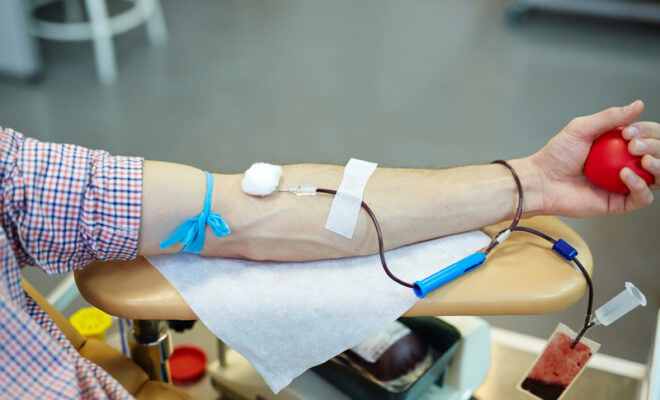The Pros & Cons of Donating Plasma

Everyone must have encountered the ads of plasma donation for money at least once in their life. Yes, it is possible to earn money by donating plasma and it is completely legit. But before donating plasma one should know about what plasma is and what are the advantages and disadvantages of donating it.
Plasma or to be very specific blood plasma is a very important substance of the blood. Plasma is yellowish in color and half of the blood is made out of it. The plasma itself is composed of water and proteins mostly. Plasma is used in medical treatments for severe trauma care, burns, shock, etc. Plasma is very commonly used in the treatment of immunodeficiencies (clotting disorders) worldwide.
Why one should donate plasma
The plasma trade industry itself is a billion-dollar industry, and it is representing more than 1% of the United States’ total exports. The United States alone produces three-quarters of the world’s supply of plasma. The demand is growing exponentially as various types of treatments and medicines need plasma as a resource. Even some modern COVID-19 treatments use plasma these days. So the donated plasma is used in saving human lives both in the form of medicine and direct transfusion. There is no greater reason for donating plasma for someone if he/she is medically fit enough.
On the other hand, plasma donation is a rewarding side hustle for the donor also. Yes, it pays good money (kind of blood money), and it is a beneficiary for the donor’s health in many ways. According to FDA guidelines, one can donate plasma for money up to a certain amount depending upon the person’s weight. The maximum plasma donation limit is 880ml, which is roughly 2 pounds. One can earn up to $50-100 per donation in Texas spending on plasma quality and eligibility.
Pros of Donating Plasma
Let’s look at all the positive sides of plasma donation.
- According to many studies, it improves the overall health of the donor. As the rigid studies of blood at the time of donation, let the donor know about his or her current blood reports. With such practice, it becomes easier to detect any disease or the signs in the early stage. Also when one donates his or her plasma or even the whole blood, the circulatory system gets renewed and refreshed. After donation, the body automatically produces new fresh blood which is healthier for health and immunity. According to American Journal of Epidemiology studies, regular donation of plasma also lowers the risk of developing cardiovascular diseases later in life.
- With regular plasma donations, anyone can help society and feel happy by helping others. Any biological body possession is a priceless possession, and when someone donates it, whether it is blood, plasma, or organ, it provides mental satisfaction. In the absence of commercial strength, one can help his or her friends with such priceless donations.
- Plasma is used in various types of medical treatments, including Leukemia, COVID-19, immunodeficiencies, internal organ injuries, burns, etc. Plasma is hugely used in medicine development as well, so by plasma donation one can help the overall humankind even without any monetary or administrative power. For people with Leukemia, plasma is not a regular blood component, so they need regular plasma transfusion to stay alive. In that case, blood is extracted from the donor’s body and processed to separate plasma. Then the blood is transfused back into the donor’s body to harvest natural plasma. Afterward, the newly harvested plasma is pooled, stored, and prepared for medical consumption.
- If someone donates plasma at regular intervals, new plasma gets produced in his or her body, which is more immune to infections. Also, to be eligible for regular plasma donation, one must have to keep himself or herself away from any harmful lifestyles like having tattoos, smoking, drug abuse, etc. So, donating plasma makes the donor follow a healthy lifestyle.
- Helps the donor commercially as one can earn up to $50-100 per donation. Some would also pay the donors with long-term payments for their food and medicines.
Cons of Donating Plasma
Now let’s discuss the cons of donating plasma briefly.
- Some people face immediate side effects like dehydration, vein damage, fatigue, fainting, and vomiting. Though all these problems are temporary and pass away very quickly. Some people also do feel very sleepy after psalm or blood donation, in such cases doctor’s consultation and hospitalization might be needed to ensure a quick recovery.
- After the donation of plasma or blood, the level of Calcium and Sodium in the body might deplete. Due to which symptoms like numbness seizures, fainting, and tingling sensation can also be seen. Also, people’s reactions to Sodium Citrate may fluctuate. If the donor has serious medical issues like brittle bones, breathing difficulty, chronic kidney conditions, osteoporosis, the symptoms of those diseases may come to light.
- According to news media reports in the US, it is found most of the regular plasma donors are homeless and aged. They donate plasma for money even when they are not in their prime condition to donate plasma or blood. Various severe medical problems can occur to such persons if they keep on cheating on their bodies for money.
Conclusion
Plasma donation is a very noble deed just like blood donation. If someone is doing it for society, or to help a friend in need, it is really appreciable. While blood or plasma donation has medical benefits it can be considered as a part of lifestyle also. But while it comes to donation for money only, it becomes a trade that has a negative side. Though plasma donation for money is totally legit and considered as a side hustle for slime extra instant bucks, considering it as a regular source of money would lead the donor to a complicated condition later.







